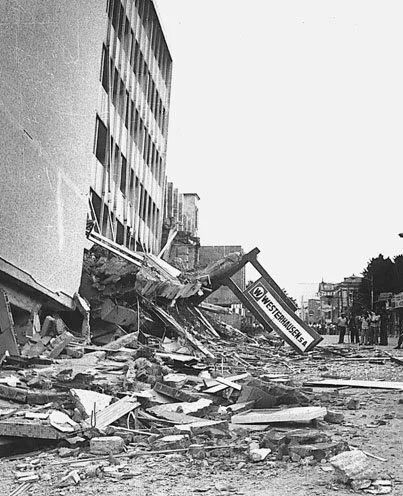Llewellyn King: We're living in an earthquake
WEST WARWICK, R.I.
I have been in only one earthquake. It was in Izmir, Turkey, in 2014. The earth moved, undulating under my feet. Buildings shook and people’s fear could be felt.
Americans have reason to believe they are in a societal earthquake of unknown intensity or long-term consequence. Everywhere the earth we have known and trusted — political, social, economic, technological, and international — seems to be moving. Institutions are shaking, technology is obliterating the familiar; new and disturbing politics is rampant, left and right; and palpable climate change has arrived.
Our foreign skill set has been found wanting. Fear for the future is resident in our consciousness.
Our politics may be the most shaken of our intuitions. What we used to know how to do — like conduct an election — is in question and the fixes, as in conservative-introduced voting bills, threaten what we have held to be secure, those very elections. Electoral results are widely distrusted in a way they never have been previously.
We used to think we knew how to educate children. Now, that is in doubt as political factions fight over the curriculum, to say nothing of masks for children. To quote a vintage ad, “What’s a mother to do?”
The COVID-19 virus continues its ravages, reduced but not vanquished. It has left its mark: It has reshaped work and play to an extent we don’t yet understand. There are jobs, at least 10 million, going begging and workers who don’t want those jobs. They range from demand for drivers and warehouse personnel, reflecting the revolution in shopping, to airport workers, hospital staff, and, of course, restaurants.
Even the aerospace industry is begging. The Northrop Grumman plant in Maryland has a huge banner facing the Amtrak tracks seeking new hires.
It is a great time to change careers, obviously.
We don’t know whether work-at-home regimes will stay or whether the human need to congregate will win out. Do you move far from the office or wait out the phenomenon?
Technology controls our lives, and that isn’t always easy to live with. Try talking to any airline, insurance company, bank, or state agency and you will need a thorough familiarity with computers because the person on the line, or the recording, wants you off the telephone and online. This, even if you called because you were stymied online, to begin with.
If you get to a human, usually in Asia, that soul likely won’t have the advantages which come with having English as a first or second language. Hard-to-reach firms’ biggest asset isn’t, as they used to say, you, the customer. You don’t count to any large organization. Stop complaining and wait for a “customer-care representative,” who will tell you to get lost after you’ve waited for hours. You are now an insignificant part of mega-data, which some in the data business have called the new oil. Some corporate websites don’t publish a phone number. Don’t bother the tranquility of the C-suite.
The poor, who should be the beneficiaries of the new technologies, are victims. Take the unbanked: That large number of people who don’t have credit cards or a bank account. They can’t get rides from Uber or Lyft, and taxis are almost completely absent from city streets.
The unbanked can’t, should they be able to afford it, check into a hotel without plastic, or make a reservation for tickets to travel or go to a concert. They are non-members of society. They are on the wrong side of the digital divide — and that is a bleak place to be. Theirs are the children who got no education during the lockdowns and who will suffer through all their lives as a result. If you miss the techno train, you walk along tracks behind it.
The rise of China has damaged our self-esteem and we fear we are looking into the chasm of cold war or worse. Likewise, the calamitous end of our time in Afghanistan has further weakened our faith in our ability to get it right. (Heck, even “Jeopardy” can’t pick a host.) Our intelligence agencies seem to have totally failed, and our military doesn’t appear to be the winning institution we have been so proud of for so long.
After an earthquake, nations rebuild the structures. We need to start rebuilding with our institutions, and first among those is buttressing the democratic system. An invincible voting rights act would be a good starting place.
Our democracy hasn’t fallen yet, but it is shaking as the ground shifts under it.
Llewellyn King is executive producer of White House Chronicle, on PBS. He’s based in Rhode Island and Washington, D.C., and his email is llewellynking1@gmail.com
On Twitter: @llewellynking2
